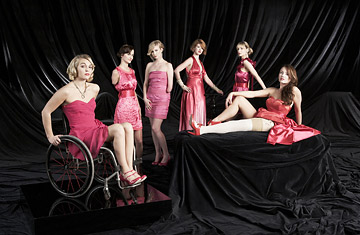
Contestants with disabilities in the new BBC program, Britain's Missing Top Model.
Aspiring model Debbie van der Putten loves her body, and she isn't afraid to show it off. The 22-year old from Helmond in the Netherlands has appeared on posters throughout Europe for charity groups, worked for a German modeling agency and recently posed nude for Playboy. While Van der Putten's chiseled stomach and striking gaze make her easy on the eyes, she hasn't exactly got the classic model's physique: three years ago, following a bus accident, doctors amputated her right arm. "I wanted to show the Netherlands that you can be beautiful, sexy and disabled," she says. "After my accident I hated mirrors. But now I love them."
Van der Putten has come to terms with her disability and made inroads into modeling. But can she help change the fashion world's conception of physical beauty? The BBC explores that idea in Britain's Missing Top Model, a new reality TV series in which Van der Putten and seven other disabled women compete for the chance to win a four-page photo spread in the U.K. edition of Marie Claire magazine. "Disabled girls are sick of being excluded from society," says Marie O'Riordan, the magazine's editor, who also serves as a judge on the program. "This show tries to shake the industry up a bit."
In that effort, the show has brought together would-be models who also include a deaf woman, a paraplegic and a contestant with a prosthetic leg — all of whom take part in competitions such as posing as 1950s pin-up girls and strutting (or, in some cases, wheeling themselves) down the catwalk. Photographers call out their best advice — "Work the eyes! Sexy!" — and industry experts such as Jonathan Phang, the agent who discovered Naomi Campbell, toughen the girls up in preparation for the notoriously fickle world of fashion. When a wheelchair-bound contestant has a flashback to her dancing days and breaks down in tears, Phang rushes her back to a runway training session: "The team is waiting," he says. "We'll cry later."
The controversial program already has the makings of a hit. The series premiere on July 1 drew half a million viewers in the U.K., driving BBC Three ratings up by 25% for the 9 p.m. time slot. That popularity will doubtless spur more debate over the show and its impact. Liz Carr, a comic who uses a wheelchair and hosts a BBC radio show on disability called Ouch!, applauds the series for presenting disabled women as beautiful and sexual, as opposed to broken and damaged. Still, she questions if reality TV is the proper platform to confront stereotypes. "I'm not sure that seeing disabled women prance around in lingerie and having their bodies objectified is the best way to change representation," she says.
True to reality TV form, the eight women live together in a crowded London penthouse, and, as the competition heats up, their claws come out. But their conflicts and insecurities, which often revolve around their disabilities, often reflect issues within the disabled community. Sophie, a 23-year old paraplegic and art student, resents the deaf contestants because they lack an obvious physical impairment. "As soon as she has the interpreter there, she's the same as any able-bodied person," she says of Kellie, a former Miss Deaf U.K. The deaf contestants have cause for their own resentment. When rushing to a 'go-see' — modelspeak for a job interview — the other contestants neglect to tell the two deaf mutes, who are nearly left behind.
The show isn't just about teaching the contestants to model: it strives to change the views of photographers and fashion editors as well. Disabilities don't necessarily detract from a photo shoot, says Phang, the contestants' on-air mentor. "With girls missing limbs, you just have to position them in a different way," he says. In some cases, disabilities even turn into strengths. According to Phang, the focus and concentration that a deaf girl needs to read lips and sign makes her "far more alert than most models."
Noticeably missing from the winner's prize package is a guaranteed contract from a top modeling agency, as offered on the CW's America's Next Top Model, the most popular TV modeling competition in the world; instead, London-based Take 2 Model Management has agreed to "consider" representing the winner. Those involved with the show remain realistic about the pace the modeling industry might change. "I don't think there's suddenly going to be a flood of disabled girls modeling," says O'Riordan.
But in a competition that requires courage as much as beauty, that may be beside the point. In episode three, five women perform in a fashion show alongside working models. Jenny, an American with partial paralysis stemming from a car accident, cannot physically balance in stilettos and struggles to control her limbs. Despite laughs in the audience, she mounts the runway. She braves three passes, her limbs shaking, and strikes her fiercest pose. She is beautiful.
